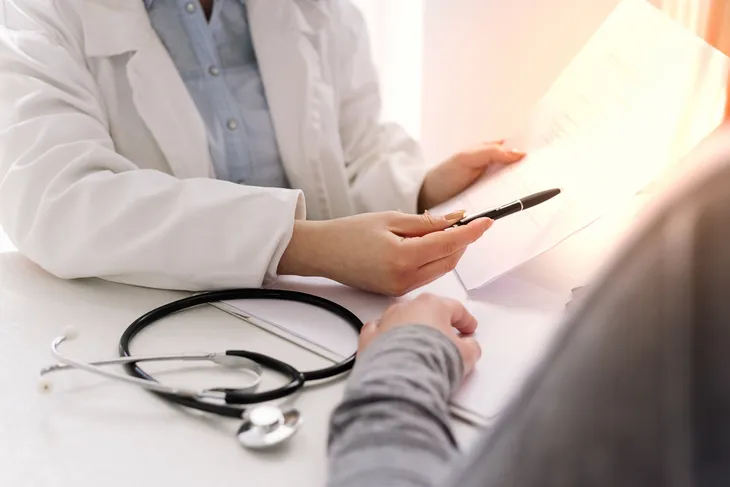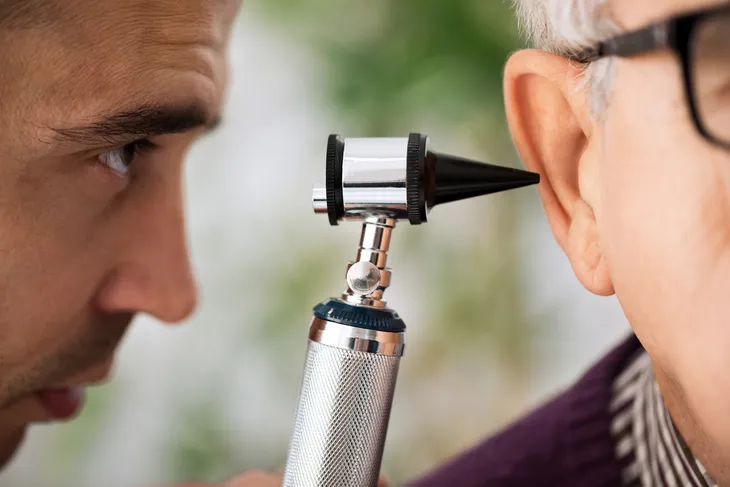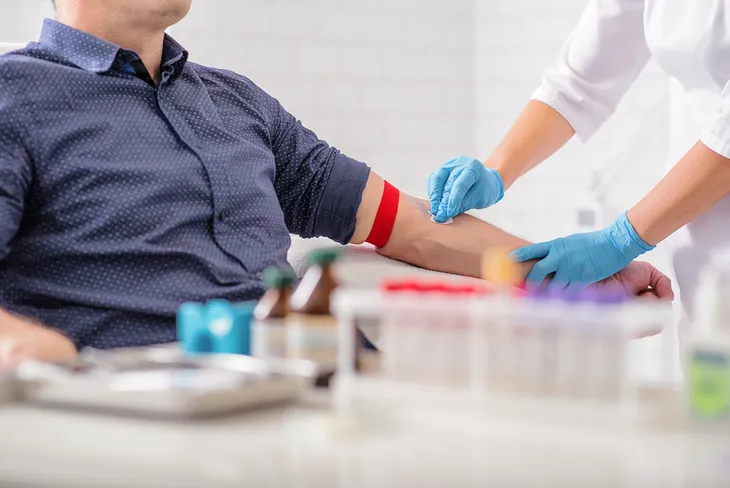- Full body checkups assess your overall health and screen for medical conditions.
- Your physician can use your checkup to make suggestions for health and lifestyle improvements.
- Full body checkups screen for a range of conditions like cancer, diabetes, and heart disease.
Many people schedule full body checkups for a variety of reasons, but the checkup itself can include a variety of tests and exams. Your health care provider may suggest regular checkups for general preventative care, or you may have certain risk factors or conditions that necessitate a checkup.
Full body checkups generally include overall physical exams, screenings, and vital sign checks. Your doctor will usually update your medical history to suggest any further tests, lifestyle changes, or future conditions to watch for. Even if you feel perfectly healthy, it’s good to know what aspects of your health your doctor will be testing.
What Are Full Body Checkups?
Physicians will sometimes set up meetings with a patient to perform a physical examination, also called a full body checkup. They use these examinations to analyze and discuss their patient’s current state of health and opportunities to make health and lifestyle improvements.
These examinations aim to help prevent diseases or conditions before they happen or to catch them early before they progress. Some tests screen for risks related to known conditions, such as diabetes or cancer. In other cases, physicians perform physical examinations to treat current conditions or to manage symptoms and improve quality of life.
When Should You Get a Full Body Checkup?
Some physicians schedule annual physical examinations for their patients, while many individuals go years without getting a full body checkup. When and how often you get a physical examination is dependent on your unique health status. Some doctors may even recommend against getting annual checkups since they may lead to unnecessary and costly testing. In some cases, you can opt for a virtual exam to determine if an in-person checkup is necessary.
You may need to get a full-body checkup for any of the following conditions:
- Illness or unexpected symptoms
- Ongoing or chronic conditions
- New medications or treatments
- Pregnancy or family planning concerns
- Known risk factors, such as smoking
How Is a Full Body Checkup Performed and How to Prepare
Your primary health care provider typically schedules and performs your full body checkup. You’ll meet first so your physician can perform exams and send off any laboratory tests, and then schedule a follow-up appointment to discuss the outcomes of your test.
Before you arrive for your checkup, take note of any changes in your health since your last examination. This may include medication changes, new allergies, or recent symptoms. You can also prepare to discuss any questions or concerns that you have about your health, such as vaccine status or family medical history.
Updated Health History
Your physician will ask for any changes in your health since your last checkup. This is a wide topic, and some examples of changes could include:
- Medications
- Allergies
- Mental health
- Supplements
- Exercise
- Sexual health
- Injuries or surgeries
- Diet
- Smoking, drinking, or other substance use
- Vaccination status
- Family history
It’s so important to inform your doctor of any changes in your health. This valuable information can help your doctor identify if there are any problems that need investigating or if you need further testing. Come prepared for your appointment and make sure you make note of any health-related changes.
 novak.elcic / Shutterstock
novak.elcic / ShutterstockVital Signs
Vital signs are helpful for detecting or monitoring medical conditions. Your physician will likely measure:
- Body temperature
- Pulse
- Respiration rate
- Blood pressure
Measuring body temperature can tell your physician if you’re healthy or fighting something off while measuring your pulse or heart rate can inform them of your heart rhythm and pulse strength. Respiration rates can tell your physician if you have any abnormal or difficult breathing. Lastly, blood pressure measures systolic and diastolic pressure and can tell your physician if you may be at risk and in need of further testing for cardiac issues.
Visual Exam
Your general appearance can say a lot about your health. Your physician will assess physical aspects such as your eyes, skin, and head. Using tools or their hands, they’ll inspect body parts from ears to abdomen to check for abnormalities and health markers. They might feel your neck to evaluate the health of lymph nodes or arteries or have you open your mouth to inspect your tonsils and throat.
They may also analyze how you move and speak to rule out any nervous system issues and look at your joints and extremities to learn about your musculoskeletal health.
Cardiac Exam and Lung Function Test
While your vital signs can indicate the level of your heart health, your physician will likely perform a cardiac exam. This involves using a stethoscope to listen for irregular heart rhythms or murmurs. Taking family history into account here is common as well.
Likewise, doctors use stethoscopes to listen to your lung functions. By listening for wheezing or other breathing issues, doctors may be able to tell if there are any restrictive or obstructive issues. Poor lung function may indicate common issues like allergies or colds but can also lead to further testing that may reveal chronic or more serious lung issues like asthma or cancer.
Laboratory Tests
Laboratory tests are not standard for full body checkups, but some physicians will order certain tests to screen for a range of conditions like heart disease, cancer, and HIV. Blood tests, urinalysis, and chemistry panels are common tests that can screen for conditions like anemia or diabetes. Complete blood counts, for example, provide an overview of blood features like red blood cells, white blood cells, platelets, hemoglobin, and hematocrit. Others like hemoglobin or blood glucose tests can suggest diabetes risk or blood sugar issues. Laboratory tests like lipid panels can also reveal information about your cholesterol levels, suggesting whether you’re at risk for related issues like heart attacks and strokes.
You won’t get the results of laboratory tests during your full body checkup, but your physician will present and discuss the results with you during your follow-up appointment.
Female Exams
If you’re biologically female, your physician might perform certain exams relating to the female anatomy. This can include a pelvic exam to check for the health of female reproductive features like the cervix. They may also perform a pap smear and check for sexually transmitted infections, which can help screen for cancers.
Breast exams are also common. During these exams, a physician feels for any lumps and looks for abnormalities in the breast tissue. If they encounter any concerns, they may request a follow-up mammogram and laboratory tests. If you notice any changes in your health or any new and suspicious lumps make sure you bring them up during your exam.
Male Exams
For biologically male patients, physicians sometimes perform exams for male-specific anatomy. Physicians may perform prostate exams by manually feeling the prostate for size and abnormalities.
Other exams may include checking for lumps, changes, or other concerns. Visually inspecting and testing for sexually transmitted diseases is also common. If your doctor identifies any areas of concern they may request further testing such as a colonoscopy (which is a test used to screen for colon cancer).
It’s also important to do self-exams at home, especially when screening for testicular cancer. Check for any lumps, bumps, or any other changes, and inform your doctor if you notice anything. If you’re not sure how to properly perform a self-exam at home, make sure you ask your doctor.
Other Screening Tests
Since full body checkups don’t have standardized screening, some individuals may be subject to different exams. This can be related to age, known risk factors, or other contexts like travel or work-necessitated tests. Other common screenings include:
- Mental health screening for depression, anxiety, or other emotional health concerns.
- Tests for neurological conditions like ADHD, Parkinson’s, and Alzheimer’s.
- Pregnancy screenings that check for blood types or syphilis, since these can affect the health of a fetus.
- Lung cancer screening for past or current smokers.
- Colorectal cancer screening for older individuals.
Full Body Checkups for Good Health
While full body checkups aren’t always necessary, particularly for young adults with no known health risks, they can be helpful screening tools that may prevent harmful conditions. So, how do you know when you need a checkup? Younger adults can often go a couple of years without seeing their doctor, while older adults may need to see the doctor more often. That said, your doctor knows your health history best, so be sure to discuss what a proper schedule looks like for you based on your health.
Communicating with your doctor is best for learning how to optimize your health, but knowing what to expect before a full body checkup can also help ease your nerves and concerns.














